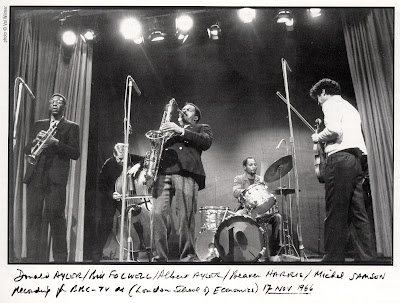 As I mentioned previously, the album "Live in Greenwich Village: The Complete Impulse Recordings" was the document that the Madison Public Library chose for my introduction to Mr. Ayler. Of course, the first disc skipped incessantly and the second disc wouldn't play at all. After spending a couple months becoming familiar with "Love Cry" and "Spiritual Unity," and starting to explore other artists in this new (to me) music that apparently lies somewhere at the cusp of what many folks tend to call "jazz," I finally purchased a copy of "Live at Greenwich Village."
As I mentioned previously, the album "Live in Greenwich Village: The Complete Impulse Recordings" was the document that the Madison Public Library chose for my introduction to Mr. Ayler. Of course, the first disc skipped incessantly and the second disc wouldn't play at all. After spending a couple months becoming familiar with "Love Cry" and "Spiritual Unity," and starting to explore other artists in this new (to me) music that apparently lies somewhere at the cusp of what many folks tend to call "jazz," I finally purchased a copy of "Live at Greenwich Village."Like much music for me, there are points in this album where melodies or brief intonations must have become etched in my brain in tandem with particular events or images from my life, forever linking the two. The music on this remarkable 2-disc set, recorded mostly in 1966 and 1967 (one track from 1965) became the backdrop for the summer of what was an exciting time in my life... preparation for a month-long adventure into the north woods of Upper Michigan which was to be followed by my marriage to the love of my life, the amazing women who continues to tolerate ( and sometimes even encourages) my many obsessions, including my passion for this strange music. At times when I listen to the album, I return to a particular day in summer 2005; a day I spent listening to this album while packing equipment and supplies in excited anticipation for the month-long UP adventure that my soon-to-be wife and I were about to embark on. There are a few high-pitched scratches of Sampson's violin that even bring back the smell of that old apartment like it was yesterday, a strange musty smell intermixed with the old campfire smell of my camping gear.


Albert Ayler, Live in Greenwich Village: The Complete Impulse Recordings
Impulse, 1965, 1966, 1967 (1998 CD)
Albert Ayler: alto and tenor saxophone
Alan Silva: bass
Beaver Harris: drums
Bill Folwell: bass
Call Cobbs: piano
Donald Ayler: trumpet
George Stell: trombone
Henry Grimes: bass
Joel Freedman: cello
Lewis Worrell: bass
Michel Sampson: violin
Sunny Murray: drums
"Live from Greenwich Village" is over two hours of rollicking marches, dirges, and triumphant wails recorded live in fantastic sound quality, as you would expect from a major label like Impulse. For most of the pieces, a beautiful and unique foundation is laid down by the strings - the violin of Michel Sampson and/or the bass of Alan Silva, Bill Folwell, Henry Grimes, and/or Lewis Worrell. Like Ayler's earlier work, most of these songs are structured around simple march-like themes, but the strings and Don's trumpet lead to a much denser sound. The album starts at a pretty high intensity, with "Holy Ghost" and Albert freely improvising over what sounds to me like some sort of vocal droning (but perhaps something else?). This is followed by a wonderful dirge-like march "Truth is Marching In." The third track is truly spectacular, a deeply emotional piece called "Our Prayer" that was written by Don Ayler. Don takes the melody on trumpet, with the violins building and releasing the intensity of the song throughout and Albert lending short punctuated cries on the sax. Most critics have blasted Don for his lack of "technical skill," but the emotional power of this song and Don's ability to convey it are truly moving - I'll take this song over anything Wynton Marsalis has ever done. "Spirits Rejoice" and "Divine Peacemaker" are both triumphant marches with extended, stratosphere-shaking free improvisations. The final song on the first disc, "Angels" is a duo piece, Albert with Call Cobbs on piano - it is stunningly beautiful and it is fascinating to hear Albert in this kind of setting. The second disc begins with "For John Coltrane," a moving and fitting tribute to the legacy of John Coltrane, who died in 1967. The piece manages to be mournful and jubilant at the same time, and for me is a real highlight of the set - although picking highlights from this collection is difficult. The remainder of the second disc is just as good as the first, continuing to use simple march-like themes as a springboard for improvisation and emotional exploration. Tell your friends. Play it for your enemies.




No comments:
Post a Comment